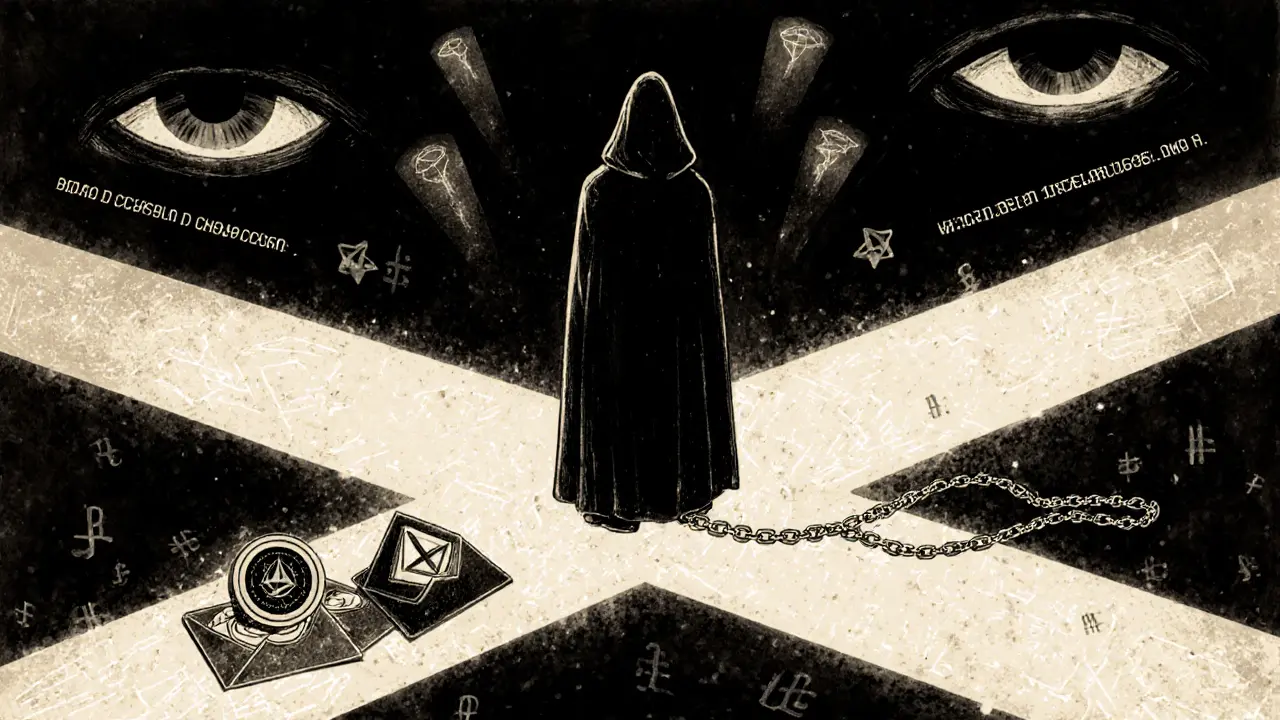Privacy Coin Risk Calculator
Assess Your Transaction Privacy
Privacy coins protect your transactions until you convert to fiat currency. Find out your risk level.
The hidden war inside your crypto transactions
Every time you send Bitcoin or Ethereum, you’re not just moving money-you’re leaving a public trail. Your address, the amount, the time, the recipient-all recorded forever on a global ledger. That’s fine if you’re buying coffee or trading tokens. But what if you’re sending money to protect your family from an oppressive regime? Or hiding savings from a corrupt government? Or just not wanting Big Brother watching every dollar you move?
That’s where the real fight in crypto isn’t about price charts or NFTs. It’s between two forces: privacy tech that hides your transactions, and surveillance tech that digs them up. And right now, surveillance is winning.
How privacy tech tries to hide your money
Bitcoin was supposed to be anonymous. It’s not. Researchers cracked it years ago. By linking addresses to real-world activity-like an exchange account or a public donation-they can trace your whole history. That’s why privacy coins were built.
Monero doesn’t show who sent what, to whom, or how much. It uses ring signatures to mix your transaction with others, stealth addresses to create one-time receiving addresses, and RingCT to hide the amount. Even if you have the whole blockchain, you can’t tell which output belongs to whom. It’s like sending a letter in a sealed envelope that gets mixed with 99 others before being delivered.
Zcash goes another route: zero-knowledge proofs. With zk-SNARKs, you can prove you have the right to send money without revealing the sender, receiver, or amount. The network validates the transaction mathematically, but sees nothing. It’s like showing a lock works without showing the key.
These aren’t theoretical. Monero processes over 200,000 transactions daily. Zcash has sent more than $10 billion in private transactions since 2016. They work. They’re secure. And they’re under fire.
How surveillance tech finds what’s hidden
Companies like Chainalysis, Elliptic, and CipherTrace don’t need to break cryptography to track you. They just need patterns.
Transaction clustering is their favorite trick. If you send Bitcoin from Address A to Address B, and later Address B sends to Address C, they assume A and C are linked-even if you used a mixer. They look at timing, amounts, and network behavior. If two addresses always send the same amount at the same time of day, they’re probably the same person.
They combine this with exchange data. When you cash out to a bank, you give your ID. That link-your name to your wallet-is the golden thread. Even if you used a privacy coin, you eventually have to convert it to fiat. That’s the choke point.
In 2023, the U.S. Department of Justice arrested the founders of Samourai Wallet, a privacy-focused Bitcoin app, for allegedly helping criminals launder money. The case didn’t prove any crimes happened. But it sent a message: if your tool makes tracking impossible, you’re a target.

Regulators are turning privacy into a crime
Exchanges like Coinbase, Binance, and Kraken have delisted Monero, Zcash, and other privacy coins-not because they’re illegal, but because compliance is too risky. Regulators demand that exchanges know who’s sending what. If they can’t, they face fines, license revocations, or criminal charges.
China banned all crypto. Saudi Arabia and Qatar followed. Russia is trying. The U.S. doesn’t ban privacy coins-but it makes them nearly impossible to use legally. You can’t trade them on major U.S. platforms. You can’t cash them out easily. Banks freeze accounts linked to them.
Even the EU’s MiCA regulation, meant to bring clarity to crypto, requires exchanges to collect and report transaction data. Privacy coins don’t fit. They’re treated like weapons, not tools.
But here’s the twist: most privacy coin users aren’t criminals. They’re journalists in Belarus, activists in Iran, small business owners in Venezuela, or just people who don’t want their spending habits sold to advertisers. When you criminalize privacy, you don’t stop crime-you stop ordinary people from protecting themselves.
The new battleground: smart contracts and cross-chain privacy
It’s not just about sending coins anymore. DeFi, NFTs, and smart contracts are the new frontier.
Imagine running a business on Ethereum. You pay suppliers, receive payments, track inventory-all on-chain. But you don’t want competitors to see your profit margins or customer lists. That’s where privacy layers come in. Projects like Tornado Cash (now banned in the U.S.) and Aztec Network let you mix your DeFi transactions. You can deposit ETH, wait, and withdraw it from a different address-breaking the link.
But surveillance tools are catching up. New AI models can now detect mixing patterns across chains. If you use Tornado Cash to send ETH to Arbitrum, then swap it for DAI on Uniswap, the system can still flag it as suspicious-even if the money is clean.
Privacy tech is fighting back with cross-chain privacy bridges and DAG-based ledgers like Obyte. These systems remove centralized validators entirely. No miners. No nodes. Just peer-to-peer transactions that can’t be censored or traced. But they’re still niche. Mainstream adoption? Not yet.

The philosophical split: privacy as a right or a risk
Edward Snowden put it bluntly: “Privacy is not a tool for criminals. Privacy is the foundation of freedom.”
That’s the core argument. If you allow surveillance to be the default, you give governments the power to monitor, punish, and control. In countries where dissent is punished, privacy isn’t a luxury-it’s survival.
But regulators say: “If we can’t see it, we can’t stop it.” They point to darknet markets, ransomware payments, and sanctions evasion. And yes, privacy coins have been used for these things. But so have cash, wire transfers, and shell companies. Why target crypto?
The answer is simple: crypto is transparent by design. It’s the only financial system where every transaction is visible. That’s why it’s the first target. Once they control crypto privacy, they’ll turn to banking, payments, and eventually, everyday spending.
What’s next? Quantum, AI, and the endgame
Both sides are racing toward quantum computing. Today’s encryption-used in both privacy tech and surveillance tools-could be broken by a quantum computer in 10-15 years. Privacy advocates are already building quantum-resistant algorithms. Surveillance firms are training AI to predict transaction patterns before they happen.
AI doesn’t just find criminals. It finds patterns in your behavior. If you send small amounts every Tuesday, it flags you as a salary recipient. If you send to a known mixer, it labels you high-risk-even if you’ve never broken a law.
There’s no clear winner. Privacy tech will keep getting better. Surveillance tech will keep getting smarter. The real question isn’t who wins the race-it’s who gets to decide the rules.
Will we live in a world where your financial privacy is the default? Or one where you need government permission to send money anonymously?
Why this matters to you
You might think, “I don’t use privacy coins. I’m not a criminal.” But if you use any crypto, you’re already part of this war.
Every time an exchange delists a privacy coin, it weakens the whole ecosystem. It sends a signal: anonymity is dangerous. That erodes trust in crypto as a whole.
Every time a government demands you prove why you sent money, you’re giving up a basic freedom. And once that precedent is set, it doesn’t stop at crypto. It spreads to your bank, your phone, your online purchases.
This isn’t about Bitcoin vs Monero. It’s about who controls your money-and whether you still own it.

Bruce Bynum
November 2, 2025 AT 08:49Phyllis Nordquist
November 3, 2025 AT 14:47Jason Coe
November 4, 2025 AT 08:12Brett Benton
November 5, 2025 AT 10:22David Roberts
November 7, 2025 AT 02:30Monty Tran
November 8, 2025 AT 03:17Beth Devine
November 8, 2025 AT 12:27Masechaba Setona
November 9, 2025 AT 08:27Eliane Karp Toledo
November 9, 2025 AT 14:28Chris Strife
November 10, 2025 AT 15:00Mehak Sharma
November 12, 2025 AT 13:25bob marley
November 13, 2025 AT 10:13Jeremy Jaramillo
November 15, 2025 AT 03:31Sammy Krigs
November 15, 2025 AT 08:18naveen kumar
November 17, 2025 AT 03:08Brian McElfresh
November 17, 2025 AT 11:38Malinda Black
November 18, 2025 AT 15:01Wesley Grimm
November 19, 2025 AT 05:06Jason Coe
November 20, 2025 AT 09:06